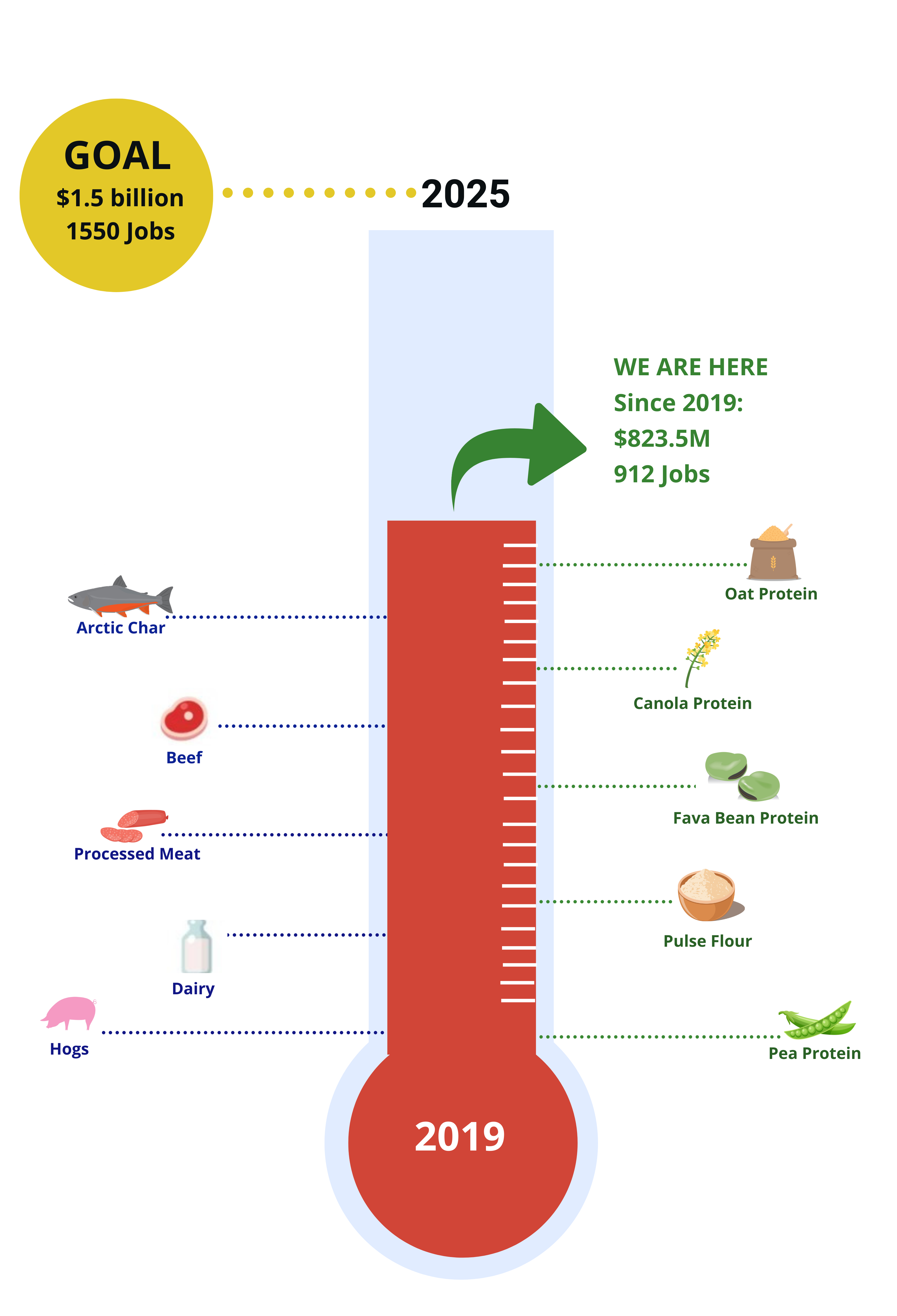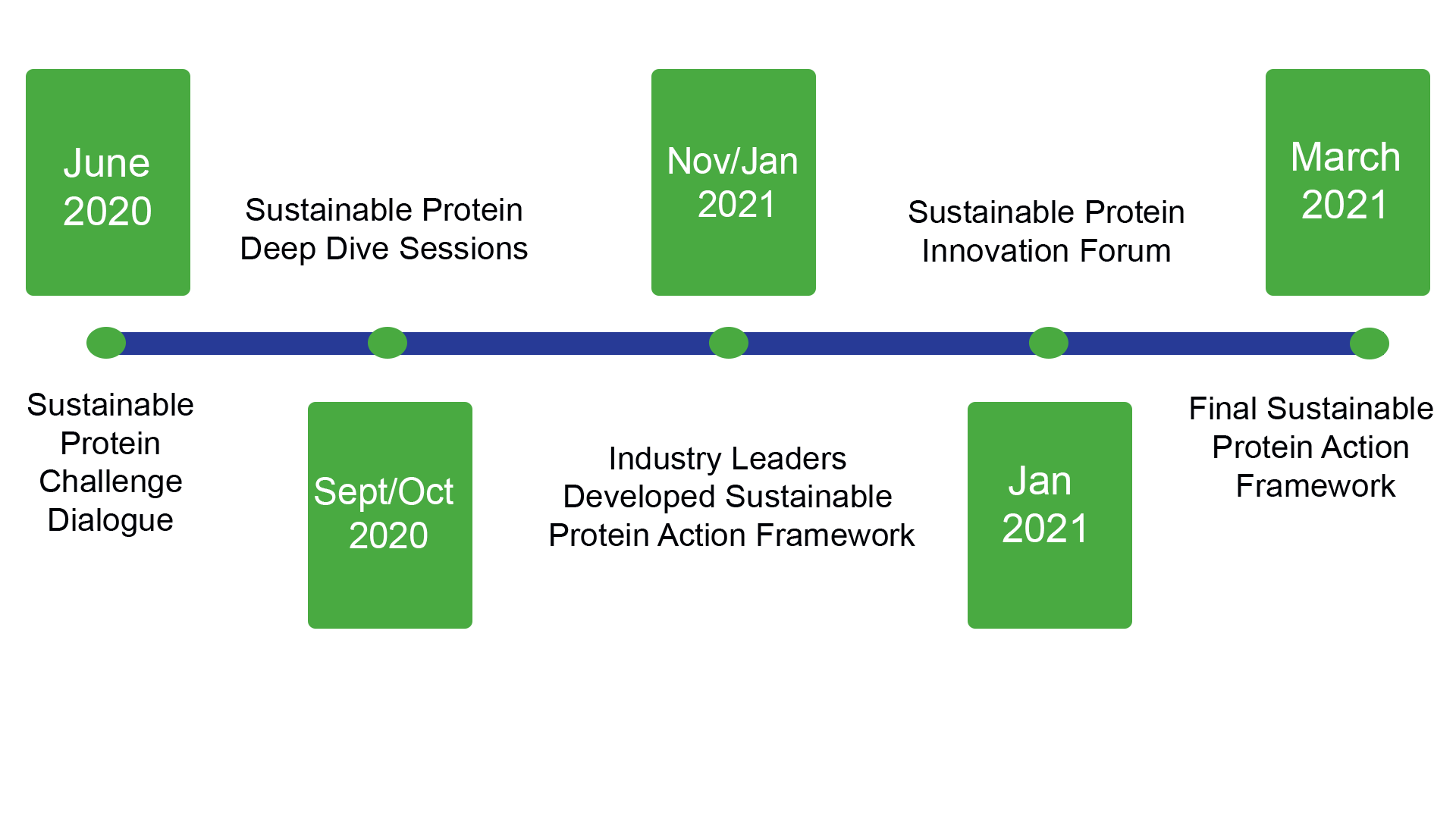
Manitoba’s Protein Advantage
Manitoba is home to the world’s largest pea processing facility, the world’s largest hemp processing company, the first canola protein processor in North America, and Canada’s largest bacon processing facility. Manitoba's growing demand for protein allows it to process the raw commodity as well as incorporate its manufactured ingredients into additional value-added consumer products. It is also home to cutting-edge food processing and world-class research infrastructure in the agri-food space.
Explore the following links to learn more about Manitoba's Protein Advantage:
- The Manitoba Protein Advantage Strategy
- Strategic Leadership of the Strategy
- Implementing the Strategy: Manitoba's Animal Protein Industry
- Manitoba’s Protein Advantage Journey
The Manitoba Protein Advantage Strategy
Manitoba released the Manitoba Protein Advantage in 2019 to grow the plant and animal protein industry by creating new value for producers and processors through targeted innovation and value chain collaboration. The key objectives of the strategy are to attract new investments of $1.5 billion and create 1,550 jobs by 2025.
Click here to see the full strategy framework.

Stakeholder engagements identified 10 Functional Areas of Sustainable Protein, creating the basis for the strategy’s approach. Targeted actions supporting each of these areas will support Manitoba in reaching its long-term goal:
“Through strengthened collaboration and accelerated innovation, Manitoba realizes its collective and equitable potential to produce protein that is diverse, high quality, healthy and increasingly sustainable.”
The 10 Functional Areas of Sustainable Protein include:
- Sustainable Protein: The Industry
- Soil, Ecosystems, and Biodiversity
- Innovation
- Finance
- Measurement, Monitoring, and Verification
- Working Together
- Workforce
- Enabling Policy and Infrastructure
- Information and Knowledge
- Branding, Marketing, and Communication
How to Read the Protein Advantage Strategy Framework
Strategic Leadership of the Strategy
The Manitoba government appointed eight industry leaders to a Manitoba Protein Consortium to provide leadership and direction on projects of strategic importance and encourage stakeholder mobilization to position Manitoba as a global leader in sustainable protein and as a protein supplier of choice.
A design team of 17 individuals representing a diverse range of stakeholder groups co-created the strategy framework. These individuals now act as a strategic advisory body to provide insight and guidance into the implementation of the strategy.
Project ASPIRE: Accelerating Sustainable Protein Impact and Results is the industry-led implementation of the Manitoba Protein Advantage Strategy. Each functional area of sustainable protein will be activated through projects initiated by industry-led ASPIRE Roundtables for Sustainable Protein. Targeted stakeholder consultations inform the projects activated by these working groups.
Learn more about Why ASPIRE.
Implementing the Strategy: Manitoba's Animal Protein Industry
Manitoba’s Protein Advantage Journey
Utilizing Challenge Dialogue Systems to Co-create the Strategy
The strategy began with a Challenge Dialogue, engaging a range of stakeholders on the challenge of advancing sustainable protein — for Manitoba, Canada, and the world. The essence of this dialogue was thinking about how to innovate and prioritize approaches to responsibly feed a global population projected to reach nearly 10 billion by 2050. Several stakeholder engagements followed to shape the direction of the Strategy.

The Sustainable Protein Challenge Paper puts this challenge into context and poses critical questions. This Progress Report shares what we learned from this initial dialogue.
- Deep-dive sessions envisioned the future of sustainable protein. This Summary Report illustrates the findings of these workshops.
- The Manitoba Protein Consortium engaged Prairie Research Associates Inc. to facilitate eight targeted focus groups with 41 industry leaders from 40 organizations.
- The purpose was to learn more about their organization's role in advancing growth, sustainability, and innovation in Manitoba’s protein industry.
- The discussion brought out key opportunities and issues to advance Manitoba’s protein industry.
- After the initial development of the Strategy framework, a Sustainable Protein Innovation Forum brought together over 85 stakeholders to explore where their organizations are aligned with the Strategy. See active and top-priority areas here.
- Currently, the industry-led ASPIRE Roundtables for Sustainable Protein are being formed for each of the 10 functional areas of the Strategy.
- These working groups will develop tangible projects to initiate recommended actions in the Strategy.
Since 2019, the Manitoba government has hosted a protein summit to celebrate the Strategy’s progress, highlight key trends and innovations in protein, and connect with pace-setting industry leaders across the globe in the protein space.
Aligning the Manitoba Protein Advantage with Global Efforts
Final Report of the National Supply Chain Task Force 2022
The transportation supply chain is an integral part of Canadian agriculture. Assurance of supply and international trade depends heavily on it. Rapidly changing trade patterns, human- and climate-related supply chain disruptions, shifting geopolitical risk, and increased consolidation in major transportation modes are a few of the challenges cited by the National Supply Chain Task Force’s recent report.
The National Supply Chain Summit, hosted in January 2022, focused on how the government and stakeholders can work together to create resiliency in supply chains, solve existing congestion and dependability issues, and position Canada's transportation supply chain to be locally and globally competitive long-term.
The National Supply Chain Task Force proposes 13 immediate and urgent initiatives as well as eight long-term strategic recommendations.
The Manitoba Protein Advantage (MPA) Strategy acknowledges that the transportation supply chain is critical to the sustainable growth of Manitoba’s protein industry. The MPA Strategy framework addresses this in the functional area Enabling Policy and Infrastructure (PI) in the following recommended action:
PI07i: "Assess and communicate current and future transportation and distribution needs, costs, and plans of the sustainable protein supply chain periodically"
The MPA Strategy is actively working towards achieving resiliency across the protein supply chain and recommends this intervention to support the targets proposed by the National Supply Chain Task Force.
Access the Final Report of The National Supply Chain Task Force 2022 here.
Contact
If you have questions about Manitoba’s Protein Advantage Strategy, want to get involved with Project ASPIRE, or would like this information in an alternate format, email us at: mbproteinadvantage@gov.mb.ca.

